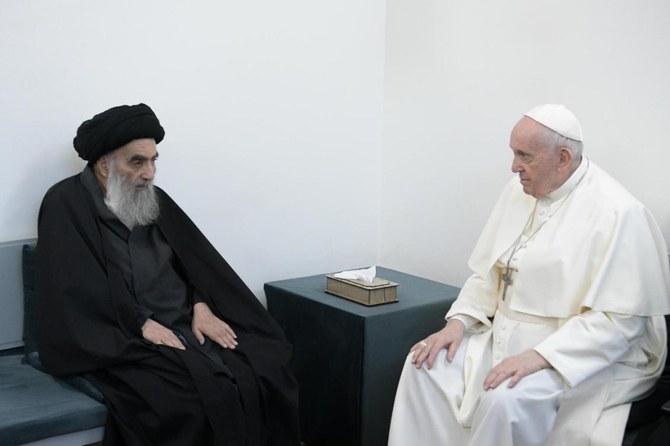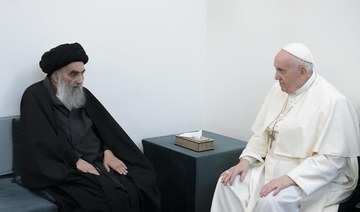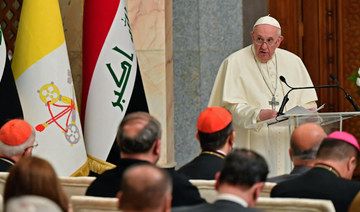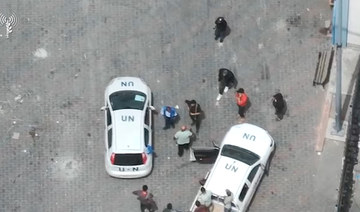ROME: Christians in Iraq should live in “peace and security,” Grand Ayatollah Ali Al-Sistani, one of Shiite Islam’s top clerics, told Pope Francis in a historic meeting on the second day of the first-ever papal visit to the country.
The 84-year-old pope and 90-year-old Al-Sistani spoke for 50 minutes at the latter’s home in Najaf, the third-holiest city for Shiite Muslims after Makkah and Madinah — a landmark moment in modern religious history, and a milestone in the pope’s efforts to deepen interfaith dialogue, Vatican sources told Arab News while expressing satisfaction with the meeting.
Al-Sistani, according to a statement issued by his office, was grateful to the pope for his visit, and “affirmed … that Christian citizens should live like all Iraqis in peace and security, and with their full constitutional rights.”
Vatican spokesman Matteo Bruni said the pope “stressed the importance of cooperation and friendship between religious communities in contributing, through the cultivation of mutual respect and dialogue, to the good of Iraq, the region and the entire human family.”
Bruni added that the meeting was an occasion for the pope to thank Al-Sistani “for speaking up, together with the Shiite community, in defense of those most vulnerable and persecuted amid the violence and great hardships of recent years, and for affirming the sacredness of human life and the importance of the unity of the Iraqi people.”
The pope, said Bruni, “stated that he continues to pray that God, the Creator of all, will grant a future of peace and fraternity for the beloved land of Iraq, for the Middle East and for the whole world.”
After the meeting, the pope flew to the city of Nassiriya. He then traveled by car to the Plain of Ur, where Abraham is believed to have been born, for a meeting with representatives of Iraq’s religious communities, including Christians, Sunnis, Shiites, Yazidis, Mandeans, Kakais, Bahais and Zoroastrians, each wearing their traditional religious garb.
Freedom of conscience and religion are “fundamental rights” that should be respected everywhere, said the pope.
“We believers cannot be silent when terrorism abuses religion and sows hatred,” he added, in a message of solidarity with minorities persecuted by Daesh.
He also called for “unity,” adding: “Let us ask for this in praying for the whole Middle East. Here I think especially of neighboring war-torn Syria.”
He said: “The most blasphemous offense is to profane God’s name by hating our brothers. Hostility, extremism and violence have nothing to do with faith — they are betrayals of religion.”
The pope then celebrated his first Mass in Iraq in the Chaldean Cathedral of St. Joseph in central Baghdad.
Only a small crowd was allowed in the church in order to guarantee social distancing due to the coronavirus pandemic.
On Sunday, the pope will celebrate Mass in Erbil, capital of the autonomous region of Iraqi Kurdistan, where 10,000 faithful will be allowed.




























